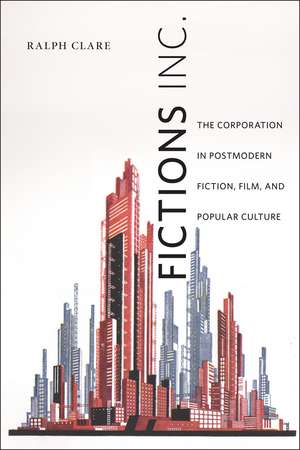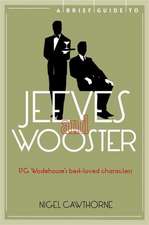Fictions Inc.: The Corporation in Postmodern Fiction, Film, and Popular Culture
Autor Ralph Clareen Limba Engleză Paperback – 11 sep 2014
Fictions Inc. explores how depictions of the corporation in American literature, film, and popular culture have changed over time. Beginning with perhaps the most famous depiction of a corporation—Frank Norris’s The Octopus—Ralph Clare traces this figure as it shifts from monster to man, from force to “individual,” and from American industry to multinational “Other.” Clare examines a variety of texts that span the second half of the twentieth century and beyond, including novels by Thomas Pynchon, William Gaddis, Don DeLillo, Richard Powers, and Joshua Ferris; films such as Network, Ghostbusters, Gung Ho, Office Space, and Michael Clayton; and assorted artifacts of contemporary media such as television’s The Office and the comic strips Life Is Hell and Dilbert.
Paying particular attention to the rise of neoliberalism, the emergence of biopolitics, and the legal status of “corporate bodies,” Fictions Inc. shows that representations of corporations have come to serve, whether directly or indirectly, as symbols for larger economic concerns often too vast or complex to comprehend. Whether demonized or lionized, the corporation embodies American anxieties about these current conditions and ongoing fears about the viability of a capitalist system.
| Toate formatele și edițiile | Preț | Express |
|---|---|---|
| Paperback (1) | 308.86 lei 6-8 săpt. | |
| Rutgers University Press – 11 sep 2014 | 308.86 lei 6-8 săpt. | |
| Hardback (1) | 827.98 lei 6-8 săpt. | |
| Rutgers University Press – 11 sep 2014 | 827.98 lei 6-8 săpt. |
Preț: 308.86 lei
Nou
Puncte Express: 463
Preț estimativ în valută:
59.11€ • 61.36$ • 49.29£
59.11€ • 61.36$ • 49.29£
Carte tipărită la comandă
Livrare economică 22 martie-05 aprilie
Preluare comenzi: 021 569.72.76
Specificații
ISBN-13: 9780813565873
ISBN-10: 0813565871
Pagini: 262
Dimensiuni: 152 x 229 x 20 mm
Greutate: 0.39 kg
Ediția:None
Editura: Rutgers University Press
Colecția Rutgers University Press
ISBN-10: 0813565871
Pagini: 262
Dimensiuni: 152 x 229 x 20 mm
Greutate: 0.39 kg
Ediția:None
Editura: Rutgers University Press
Colecția Rutgers University Press
Notă biografică
RALPH CLARE is an assistant professor of English at Boise State University.
Cuprins
Acknowledgments
Introduction: From Manchuria to Manchuria Inc.
1 California Dreaming: Twentieth-Century Corporate Fictions at the End of the Frontier
2 “Domo Arigato, Mr. Sakamoto, for the New Non-Union Contract!”: (Multi)National Threats and the Decline of the American Auto Industry in Ron Howard’s Gung Ho
3 Good Times, Bad Times . . . You Know I Had My Share(s): The Corporation in Five Popular Films
4 A Capital Death: Medicine, Technology, and the Care of the Self in Don DeLillo’s White Noise
5 Family Incorporated: William Gaddis’s J R and the Embodiment of Capitalism
6 Your Loss Is Their Gain: The Corporate Body and the Corporeal Body in Richard Powers’s Gain
Conclusion: Corporate Hegemony, Cubed
Notes
Works Cited
Index
Introduction: From Manchuria to Manchuria Inc.
1 California Dreaming: Twentieth-Century Corporate Fictions at the End of the Frontier
2 “Domo Arigato, Mr. Sakamoto, for the New Non-Union Contract!”: (Multi)National Threats and the Decline of the American Auto Industry in Ron Howard’s Gung Ho
3 Good Times, Bad Times . . . You Know I Had My Share(s): The Corporation in Five Popular Films
4 A Capital Death: Medicine, Technology, and the Care of the Self in Don DeLillo’s White Noise
5 Family Incorporated: William Gaddis’s J R and the Embodiment of Capitalism
6 Your Loss Is Their Gain: The Corporate Body and the Corporeal Body in Richard Powers’s Gain
Conclusion: Corporate Hegemony, Cubed
Notes
Works Cited
Index
Recenzii
“This well-conceived, well-executed, and theoretically informed study is wonderfully original—it will appeal not only to literature scholars but also, I should think, to all interested in economics, sociology, literary theory, and film."
"In the wake of the financial collapse and the Occupy movement, Fictions Inc. anatomizes the corporation’s hostile takeover of American culture and argues for fiction's and film’s ability to resist the current order—and demonstrates criticism’s ability to do the same."
"Fictions Inc is highly topical and fills the existing void in literary criticism, namely in the depiction of the corporation ... this well-informed study shows that literature and culture are not only engaged in racial and sexual politics, but also in the examination and critique of late capitalism."
Descriere
Fictions Inc. explores how depictions of the corporation in American literature, film, and popular culture have changed over time. Paying particular attention to the rise of neoliberalism, the emergence of biopolitics, and the legal status of “corporate bodies,” Fictions Inc. shows that representations of corporations have come to serve, whether directly or indirectly, as symbols for larger economic concerns often too vast or complex to comprehend.









